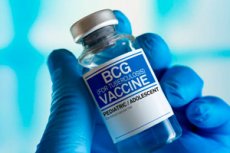
麻省总医院 (MGH) 研究人员领导的一项新研究表明,最初为预防结核病而开发的百年历史的卡介苗 (BCG) 疫苗可以保护 1 型糖尿病患者免于患上 COVID-19 和其他传染病的严重疾病。
两项随机、双盲、安慰剂对照研究发现,无论病毒变体如何,卡介苗在美国 COVID-19 大流行的大部分时间里都能提供持续保护。
“患有 1 型糖尿病的人极易感染传染病,感染 SARS-CoV-2 病毒后后果会更糟,”资深研究作者、麻省总医院免疫生物学实验室主任、哈佛医学院医学副教授 Denise Faustman 博士说。
其他研究人员发表的数据显示,mRNA 新冠疫苗对这一脆弱患者群体效果不佳。但我们已经证明,卡介苗可以保护 1 型糖尿病患者免受新冠和其他传染病的侵害。
发表在《iScience》上的这项为期18个月的III期临床试验在美国疫情后期进行,当时高传染性Omicron变异株正在美国流行。一项为期15个月的II期临床试验是在疫情初期进行的;该研究结果发表在《Cell Reports Medicine》上。
在COVID-19疫情期间,多项国际研究测试了卡介苗(BCG)作为单剂或加强剂接种给既往接种过疫苗的成年人,是否能够保护他们免受感染和COVID-19。这些研究补充了一个庞大的全球临床试验数据库,该数据库表明,给新生儿接种卡介苗可以作为所有传染病的“平台”,并且可能持续数十年。然而,这些针对既往接种过疫苗人群的卡介苗加强剂研究结果喜忧参半:五项随机试验显示有效,七项则无效。
麻省总医院(MGH)的卡介苗(BCG)II 期和 III 期临床试验与其他 BCG 研究有显著不同。参与者接种的不是单剂 BCG,而是五剂或六剂强效 BCG 疫苗。美国参与者的随访时间为 36 个月,而不是几周或几个月。
“我们知道,对于以前未接种过卡介苗的人来说,脱靶效应至少需要两年时间才能达到完全保护的效果,”福斯特曼说。“重复接种疫苗可以加快这一过程。”
而且重要的是,美国民众从未接种过卡介苗,因此这些临床试验不是加强剂研究。
福斯特曼表示:“麻省总医院开展的II期和III期试验非常独特,因为它们是全球唯一一项受试者未接种过卡介苗或未接触过结核病的COVID-19试验。在参与者曾在新生儿时期接种过卡介苗或接触过结核病的国家进行的试验,可能会掩盖卡介苗加强针的任何益处。”
MGH 的研究涉及 141 名 1 型糖尿病患者;治疗组 93 人接种了五到六剂 BCG 疫苗,安慰剂组 48 人接种了假疫苗,并进行了 36 个月的随访,以追踪 COVID-19 和许多传染病的不同基因变异。
在早期 II 期研究(2020 年 1 月至 2021 年 4 月)期间,当病毒致命性更高但传染性较低时,卡介苗的有效率为 92%,与辉瑞和 Moderna COVID-19 疫苗在健康成人中的有效性相当。
在美国新冠疫情肆虐的整个34个月中,卡介苗的有效率高达54.3%。研究人员还发现,接受卡介苗治疗的参与者病毒、细菌和真菌感染以及新冠疾病本身的发病率较低。
卡介苗提供的免疫力可能持续数十年,这比新冠疫苗和流感等其他传染病疫苗有明显优势,因为其他疫苗的有效期只有两三个月。
福斯特曼说:“卡介苗有望为人们提供几乎终生的保护,预防所有种类的新冠肺炎、流感、呼吸道合胞病毒和其他传染病。”
部分接受卡介苗治疗的参与者在III期试验期间也接种了市售的新冠疫苗。研究人员指出,辉瑞、Moderna和强生的疫苗并不能保护1型糖尿病患者免受新冠感染。
“我们的研究表明,卡介苗并没有提高新冠疫苗的有效性,而且对接种新冠疫苗的人也无害,”福斯特曼说。“随着疫情的持续发展,我们能否与FDA合作,为1型糖尿病患者提供卡介苗接种服务,将会非常有趣,因为这类患者似乎特别容易感染所有传染病。”

